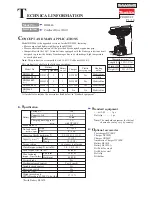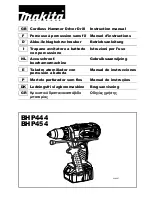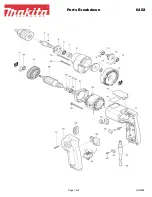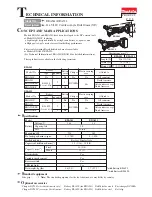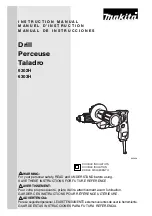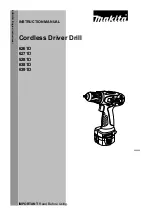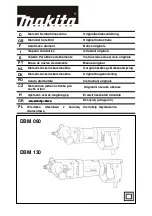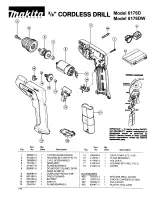
9 ENGLISH
Adjusting the fastening torque
►
Fig.7:
1.
Adjusting ring
2.
Graduation
3.
Arrow
The fastening torque can be adjusted in 21 levels by turning the adjusting ring. Align the graduations with the arrow
on the tool body. You can get the minimum fastening torque at 1 and maximum torque at
marking.
The clutch will slip at various torque levels when set at the number 1 to 20. The clutch does not work at the
marking.
Before actual operation, drive a trial screw into your material or a piece of duplicate material to determine which
torque level is required for a particular application.
The following shows the rough guide of the relationship between the screw size and graduation.
Graduation
1
2
3
4
5
6
7
8
9
10 11 12 13 14 15 16 17 18 19 20
Machine screw
M4
M5
M6
Wood
screw
Soft wood
(e.g. pine)
–
ø3.5 x 22
ø4.1 x 38
–
Hard wood
(e.g. lauan)
–
ø3.5 x 22
ø4.1 x 38
–
ASSEMBLY
CAUTION:
Always be sure that the tool is
switched off and the battery cartridge is removed
before carrying out any work on the tool.
Installing or removing driver bit/
drill bit
For Model DF332D (optional accessory)
►
Fig.8:
1.
Sleeve
2.
Close
3.
Open
Turn the sleeve counterclockwise to open the chuck jaws.
Place the driver bit/drill bit in the chuck as far as it will go.
Turn the sleeve clockwise to tighten the chuck. To remove
the driver bit/drill bit, turn the sleeve counterclockwise.
Installing or removing driver bit/
socket bit
For Model DF032D (optional accessory)
►
Fig.9
Use only driver bit/socket bit that has inserting portion
shown in the figure. Do not use any other driver bit/
socket bit.
For tool with shallow driver bit hole
A=12mm
B=9mm
Use only these type of driver
bit. Follow the procedure
1. (Note) Bit-piece is not
necessary.
For tool with deep driver bit hole
A=17mm
B=14mm
To install these types of driver
bits, follow the procedure 1.
A=12mm
B=9mm
To install these types of driver
bits, follow the procedure 2.
(Note) Bit-piece is necessary
for installing the bit.
1. To install the driver bit, pull the sleeve in the direc
-
tion of the arrow and insert the driver bit into the
sleeve as far as it will go.
Then release the sleeve to secure the driver bit.
►
Fig.10:
1.
Driver bit
2.
Sleeve
2. To install the driver bit, pull the sleeve in the direc
-
tion of the arrow and insert the bit-piece and driver
bit into the sleeve as far as it will go. The bit-piece
should be inserted into the sleeve with its pointed
end facing in. Then release the sleeve to secure
the driver bit.
►
Fig.11:
1.
Driver bit
2.
Bit-piece
3.
Sleeve
To remove the driver bit, pull the sleeve in the direction
of the arrow and pull the driver bit out.
NOTE:
If the driver bit is not inserted deep enough
into the sleeve, the sleeve will not return to its original
position and the driver bit will not be secured. In this
case, try re-inserting the bit according to the instruc
-
tions above.
NOTE:
After inserting the driver bit, make sure that it
is firmly secured. If it comes out, do not use it.
Installing hook
WARNING:
Use the hanging/mounting parts
for their intended purposes only, e.g., hanging the
tool on a tool belt between jobs or work intervals.
WARNING:
Be careful not to overload the
hook as too much force or irregular overburden
may cause damages to the tool resulting in per-
sonal injury.
CAUTION:
When installing the hook, always
secure it with the screw firmly.
If not, the hook
may come off from the tool and result in the personal
injury.
CAUTION:
Make sure to hang the tool
securely before releasing your hold.
Insufficient
or unbalanced hooking may cause falling off and you
may be injured.
►
Fig.12:
1.
Groove
2.
Hook
3.
Screw
The hook is convenient for temporarily hanging the tool.
This can be installed on either side of the tool. To install
the hook, insert it into a groove in the tool housing on
either side and then secure it with a screw. To remove,
loosen the screw and then take it out.

























